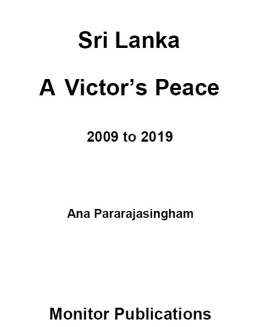Victors Justice
A letter intended to have been sent
to a friend recently in Germany
by Montgomery Belgion
1949
VICTORS JUSTICE
A letter intended to have been sent
to a friend recently in Germany
by Montgomery Belgion
Copyright 1949 by Montgomery Belgion.
First edition: Henry Regnery Company, Hinsdale, Illinois, 1949.
This edition: March 2017
Published by Paul Bondarovski
under the Creative Commons Attribution License 3.0
Publishers website: www.wariscrime.com
Design, layout and cover 2017 by Paul Bondarovski.
Cover background: fragment of the painting by Herbert Smagon.
ISBN 978-1-365-84778-3
Evn victors are by victories undone.
Dryden
NOTE
I have no difficulty in holding strong opinions. Some I have held longer than I realize. I have imagined that I was expressing one for the first time, and then have happened to discover that I had only forgotten having expressed it years before. The opinions supported in the following pages I already avowed in 1938. My difficulty is not in holding opinions. My difficulty lies in ascertaining why I hold the particular opinions I do.
In February 1947, I published in England a little book called Epitaph on Nuremberg. It was written between October 1945 and August 1946, at a time, that is to say, when much germane information had not yet become public. A publisher having lately proposed to issue the book in the United States, it occurred to both of us that the opportunity ought to be taken of expanding it. In the process of adding, however, I have been led to rewrite; not because my opinions have changed since 1946, any more than they have since 1938, but because I have discovered for them reasons which were not then apparent to me. This is virtually a new book.
I have had the benefit of reading publications by Dr. H. A. Smith, till 1946 professor of international law in the University of London, and by Mr. Louis Le Fur, formerly professor of law at Paris; and also the text of a lecture delivered at Heidelberg in 1947 by Professor Eduard Wahl. I wish also to acknowledge little helpful acts of kindness by Mr. Peter Baker, Mr. Felix Morley, and Mr. Henry Regnery, and valuable textual suggestions from Mr. Philip N. Starbuck.
But, of course, for everything I say in the following pages I alone am responsible.
M. B.
July 1948.
I
London
My dear Daniel,
At the end of 1945 you were posted to duty in occupied Germany. You had already passed the greater part of the war in that country. In the spring of 1941 you and I were among the British and Yugoslav troops who, after retreating to the shores of the Peloponnesus, were made captive by the enemy. I was repatriated in 1944. You remained a prisoner to the end. It was an American army that delivered you. Before the Americans had you flown home, you were able to take the measure of their mood. You observed that in the invasion of Germany they believed themselves to be conducting a punitive expedition such as the early transatlantic settlers had often undertaken against the Redskins. In that interpretation of the nature of their task the Americans were not singular. All the invaders went forward into Germany animated by the same spirit. The Germans were not simply an enemy; they were a kind of rebel who had to be subdued. Having been brought to surrender, the Germans were denied any longer a government of their own, and their conquerors settled down among them to hold them in indefinite subjection. But whatever the animus of the Russians and the French, Germany was not treated in that way by the British and the Americans solely for the sake of material gain. The object avowed by the latter was repression. So was it that of the French. Upon your return as a very minor overlord to the scene of your previous detention, you found, in the area in British occupation, that everything was being done as if it were the sequel to quelling disorder, and so it was in the other areas of the country. In the high summer of 1945, the four chieftains of the victorious peoples had gone together into the recesses of Potsdam Park as into a cloud and had re-emerged bearing in their hands, like new tables of Sinai, a set of commandments to the vanquished. The regimen so codified was not to be imposed on the native inhabitants of any particular region alone, but on all Germans, and its ostensible purpose was systematic retribution. Occupation, summary annexations of territory, deportations from east to west, the levy of reparations, the depression of the standard of livingall that had been decreed as the infliction of a penalty.
I do not expect my words to be translated into Russian, and they are meant to apply only to the attitude and conduct of the three victorious powers of the West. If those powers had the feeling that they were being policemen, colonial soldiery, or schoolmasters, that they had been called upon to restore order and to punish disturbers of the peace, they did not attribute the feeling to their possession of superior strength or to the heat of triumph and wrath. They believed they had a warrant. And the warrant was the war guilt of the vanquished. The western victors professed to have a title to act as they were doing, a warrant both for the kind of victory on which they insisted and for the kind of provisional peace which they afterwards decreed. The title and the warrant came from the assertion that, if there had been war, the vanquished, and the vanquished alone, were responsible. The Germans were to be understood not only to have suffered defeat, but also to bear the blame for the trouble to which the victors had been put in defeating them.
Moreover, the blame was to be considered all the greater that the Germans had been represented as having conducted the war on their side entirely without scruple, and, among other enormities, as having enslaved and murdered many thousands of the peoples whom they were supposed to have gratuitously attacked. On the side ultimately victorious certain assumptions had been adopted from the beginning. It was, for instance, assumed in high quarters that the will to victory could only be kept hot in the mass of the combatant peoples if steadily subjected to the fires of hate. On the Continent especially, the actions of the enemy played into the hands of the leaders who had made this assumption, so that to fan the fires of hate became childs play. Hence in the hour of victory the triumphant peoples were almost unanimous in regarding the Germans as guilty twice over, as having not only begun the war, but also as having made it needlessly cruel.
The nature of this particular title and the character of the after-war conduct towards the defeated which it was held to justify were not unconnected. Indeed, the connexion was unmistakable. Everything on which the three western victors insisted was a form of punishment, and punishment was needful because the Germans had been guilty. For instance, if there had to be reparations, it was on the ground that damage, wilful and unnecessary, had been inflicted. In the autumn of 1947 a petition signed by two thousand prominent English men and women was delivered to Mr. Attlee, the British prime minister, begging him to end the detention of German prisoners of war both in England and in the British possessions. The petition Mr. Attlee rejected, and the principal reason which he gave for rejecting it was that German prisoners of war, by means of their labour, were making one form of reparation for German aggression. The connexion between the title of the victors to adopt their policy and the character of that policy itself could not have been asserted more clearly.
But although the western victors produced a warrant for their policy, that policy was not successful. From the first, and especially in England and the United States, the details of the retribution to Germany specified in the Potsdam declaration gave rise to far-reaching criticisms, and, so far as the British and American authorities were concerned, the attempt to carry out retribution in that form very quickly showed the policy to be unworkable. It had to be modified. Its rigours even the French were driven by 1947 to attenuate. It is true that, as criticism was confined to details, so details alone came to be modified. The principle itself, that, as the Germans had been guilty they deserved to be punishedthat was never questioned. Notably, the legitimacy of levying reparations was not doubted. Yet events soon engendered the suspicion that more than details had been wrong. The British and American authorities came to co-operate more closely together, and their views seemed, broadly speaking, to harmonize. But the rumble of disagreement between them and the French authorities grew too loud to be successfully muffled. Further, far more radical differences of opinion regarding the operation of policy led to more serious discord between the three western victors in unison and their former great ally in the East.
Next page








